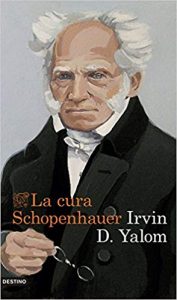Not long ago I was referring to another book about the supposed last hours of a character facing a terminal illness. It was about The rest of your daysby Jean Paul Didierlaurent. It comes to mention citing him to present this new book as the same concept narrated in an antagonistic way.
El book The Schopenhauer cure It also introduces us to its protagonist Julius Hertzfeld as a man in his sixties who is suddenly pounced on by the grim reaper and warns him of his short term on stage. In the first book cited, the perspective of the character close to his death opens our minds to a journey more vital than ever, with a touch of humor and a taste of a happy farewell amid nostalgia.
In this second case we do not discover anything from that naive perspective on how positive it can be to glimpse the day of your death. On the contrary, Julius with his term counted enters his memory, in his cases carried out as a psychotherapist. And he comes across the Philip case, a special guy who joined his therapies and with whom he never got results.
The failed case, or at least poorly closed, of Philip now seems fundamental to him to complete his task in this world. In theory, he only has one year left to live and the best way out is to close the circle of his successful performance as a therapist for so many patients.
Convinced Philip to join one of Julius's last therapy groups, his testimony becomes a source of wisdom and introspective therapy for the rest of the participants, including Julius. The ideas of Arthur Schopenhauer, from which Philip knew how to extract his cure, brings to everyone the idea of the authentic will, of the deepest motives that can help you, once you dig enough between the shovels of earth on which we hide our ego more authentic.
At times it seems as if Schopenhauer's fatalism, the patina of pessimism with which history covered him, is ultimately nothing more than a fruit of the misunderstandings of his readers and scholars. Pessimism is born from the eyes of the reader, the listener or the one who feels. Beyond the first preconceptions, while the members of the group delve into that introspection with a clean stroke, many of them end up discovering their true will, which can move them towards their most natural end, self-realization.
Julius will learn, in what may be his last therapy season, that the greatest happiness is to allow you to continue learning, until your last day.
You can now buy the novel The Schopenhauer cure, the great book of Irvin D Yalom, here:

